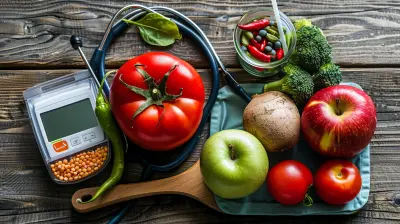Understanding the Difference Between Food Intolerance and Food Allergy
5 December 2024
When it comes to food and health, things can get pretty confusing, right? You take a bite of something, and suddenly your body starts to feel… off. But wait—are you having a food intolerance, or is it a full-blown food allergy? These two terms often get tossed around like they mean the same thing, but there’s actually a significant difference between the two. So, let's dive in and break it all down in plain, simple terms. By the end of this article, you’ll know exactly how to tell them apart and what to do if either one shows up on your plate.
What Is Food Intolerance?
Let’s start with food intolerance. You know that feeling when you eat something that just doesn’t "sit right"? That’s what we’re talking about here. A food intolerance happens when your body struggles to digest certain foods. Simply put, it’s like your digestive system is saying, "Nah, not today!"Causes of Food Intolerance
There are a few reasons why food intolerance might happen:1. Enzyme Deficiency – One of the most common culprits is a missing or insufficient digestive enzyme. For instance, if you’re lactose intolerant, your body doesn’t produce enough lactase, the enzyme needed to break down lactose (the sugar in milk).
2. Additives and Preservatives – Certain chemicals in processed foods, like sulfites in wine or MSG in junk food, can trigger intolerance.
3. Natural Compounds in Food – Even natural substances like caffeine or histamines in some foods can cause issues for some people.
Basically, food intolerance is all about your body struggling with something in the food. It’s not life-threatening, but man, it can be uncomfortable.
Symptoms of Food Intolerance
So, how do you know if you’re dealing with food intolerance? The symptoms usually show up gradually (sometimes hours after eating) and can include:- Bloating (ugh, the worst!)
- Gas
- Diarrhea or constipation
- Stomach cramps
- Headaches or migraines
- Fatigue
Sound familiar? The tricky part is these symptoms overlap with other conditions like IBS (Irritable Bowel Syndrome), so it’s not always clear-cut. But one thing’s for sure—food intolerance is all about your gut, not your immune system.
What Is a Food Allergy?
Now, onto food allergies. These are a whole different ballgame. Unlike intolerance, food allergies involve your immune system. It’s like your body mistakes harmless food proteins for dangerous invaders and goes into full-blown battle mode. Think of it as your immune system hitting the panic button—except there’s no actual threat.Causes of Food Allergy
Food allergies are caused by an overreaction of the immune system to certain proteins in food. The most common allergens (a fancy word for the culprits) are:- Milk
- Eggs
- Peanuts
- Tree nuts (like almonds, walnuts, cashews)
- Shellfish
- Wheat
- Soy
Even a tiny amount of these foods can trigger an allergic reaction, which is why they’re such a big deal.
Symptoms of Food Allergy
Here’s where it gets serious. Food allergies can show up in minutes (or even seconds), and the symptoms can range from mild to life-threatening. Here are the common ones:- Hives or itchy skin – Your skin’s way of saying “something’s not right.”
- Swelling – Think lips, tongue, or even your throat (scary stuff).
- Trouble breathing – This is when you know it’s serious.
- Abdominal pain, nausea, or vomiting – Yep, not fun.
- Anaphylaxis – This is a severe, potentially deadly reaction that requires immediate medical attention. It can cause your blood pressure to drop, your airways to close, and even lead to unconsciousness.
If you suspect a food allergy, don’t mess around. Always consult a doctor or allergist to confirm it and to learn how to manage it.
Key Differences Between Food Intolerance and Food Allergy
Alright, let’s get to the heart of the matter. The biggest differences boil down to two main things: what’s causing the reaction and how severe the symptoms are.1. The Root Cause
- Food Intolerance: It’s all about digestion. Your body doesn’t have the tools (like enzymes) it needs to process certain foods.- Food Allergy: It’s an immune system overreaction to a specific protein in the food.
2. Timing of Symptoms
- Food Intolerance: Symptoms take their sweet time—often appearing hours after you eat.- Food Allergy: Symptoms strike fast, often within minutes of eating the triggering food.
3. Severity
- Food Intolerance: It’ll make you uncomfortable, but it’s not life-threatening.- Food Allergy: It ranges from mild to severe—and in some cases, can be fatal.
4. Tests for Diagnosis
- Food Intolerance: Diagnosed through elimination diets or breath tests (like for lactose intolerance).- Food Allergy: Diagnosed through skin prick tests, blood tests, or food challenge tests under medical supervision.
5. Treatment
- Food Intolerance: Avoid the trigger food or take digestive aids like lactase supplements.- Food Allergy: Strict avoidance is key, and carrying an epinephrine auto-injector (EpiPen) is often essential.

How to Manage Each Condition
Living with food intolerance or a food allergy can feel like walking through a dietary minefield, but it doesn’t have to ruin your life. Here’s how to deal with each:Managing Food Intolerance
- Keep a Food Diary: Track what you eat and how you feel afterward. Patterns will emerge, making it easier to spot the problem foods.- Elimination Diet: Cut out suspected trigger foods and slowly reintroduce them one at a time.
- Use Substitutions: Love dairy but hate the side effects? Go for lactose-free milk or plant-based alternatives like oat or almond milk.
- Portion Control: Sometimes, your body can handle small amounts of the trigger food. (Hello, cheat day!)
Managing Food Allergy
- Avoid the Allergen Completely: No room for negotiation here. Check food labels like a hawk!- Educate Yourself: Learn about hidden sources of allergens (like peanut oil in sauces or wheat in soy sauce).
- Carry an EpiPen: It could save your life in case of anaphylaxis.
- Inform Others: Let family, friends, and even restaurant staff know about your allergy to avoid accidental exposure.
When Should You See a Doctor?
If you’re experiencing symptoms that seem like either food intolerance or allergy, don’t just guess—get it checked out! A healthcare professional can run tests to confirm what’s going on. And let’s be real, it’s better safe than sorry. If you ever experience severe symptoms like difficulty breathing or swelling, head straight to the ER or call emergency services.Final Thoughts
Understanding the difference between food intolerance and food allergy is crucial for taking control of your health. Think of it this way: food intolerance is like an annoying roommate—you can live with it, but it’s inconvenient. A food allergy, on the other hand, is like a fire alarm—you can’t ignore it, and you need to act fast.The good news? With the right knowledge and tools, you can navigate both conditions and still enjoy plenty of delicious, safe foods. So, next time someone asks, “What’s the difference between food intolerance and food allergy?” you’ll have all the answers!
all images in this post were generated using AI tools
Category:
Food AllergiesAuthor:

Madeline Howard
Discussion
rate this article
11 comments
Elsinore Jordan
Interesting distinction! How can I identify my symptoms accurately?
April 6, 2025 at 4:21 AM

Madeline Howard
To identify your symptoms accurately, keep a food diary to track what you eat and any reactions you experience. Consult with a healthcare professional for proper testing and guidance.
Layne Forbes
Thank you for this insightful article! Understanding the distinction between food intolerance and food allergies is crucial for effective management of symptoms. This resource will certainly help readers make informed choices about their health and dietary needs. Keep up the great work!
March 29, 2025 at 3:24 PM

Madeline Howard
Thank you for your kind words! I'm glad you found the article helpful in clarifying these important distinctions.
Bailey McWain
Great article! Understanding the difference between food intolerance and allergies is so important for our health. Cheers to making informed choices and enjoying every bite!
January 31, 2025 at 5:51 AM

Madeline Howard
Thank you for your kind words! I'm glad you found the article helpful in making informed choices about your health. Cheers!
Vanta McConkey
“Food intolerance is like that friend who borrows money and never pays you back—annoying but not dangerous. Food allergies, though? They're the friend who shows up uninvited to your party with a pet skunk!”
January 23, 2025 at 3:55 PM

Madeline Howard
That's a clever analogy! It perfectly captures the contrasting impacts of food intolerance and food allergies. Thanks for sharing!
Beatrix McAllister
This article succinctly clarifies the critical distinctions between food intolerance and food allergies, emphasizing the varied immune responses and symptoms associated with each. Understanding these differences is essential for effective management and treatment, ultimately enhancing overall health and well-being.
January 15, 2025 at 5:50 AM

Madeline Howard
Thank you for your thoughtful comment! I'm glad you found the distinctions between food intolerance and allergies helpful for managing health.
Sera McQuade
Great article! Understanding the difference between food intolerance and allergies is so important for managing our health. Thank you for breaking it down in such an accessible way!
January 8, 2025 at 5:53 PM

Madeline Howard
Thank you for your kind words! I'm glad you found the article helpful in clarifying these important distinctions.
Eloise Flores
Understanding the distinction between food intolerance and food allergy is crucial for managing health. While allergies can provoke severe reactions, intolerances often lead to discomfort. Educating ourselves about these differences empowers us to make informed dietary choices, enhancing our well-being and fostering a healthier relationship with food.
January 6, 2025 at 3:30 AM

Madeline Howard
Thank you for highlighting this important distinction! Understanding the differences between food intolerances and allergies is indeed essential for making informed dietary choices and promoting overall well-being.
Sloane Edwards
Important distinctions for better health!
December 19, 2024 at 5:35 PM

Madeline Howard
Thank you! Understanding these distinctions is crucial for managing health effectively.
Zephyrae Montgomery
Intriguing distinctions! Always learning more about health.
December 7, 2024 at 5:29 AM

Madeline Howard
Thank you! I'm glad you found it interesting. There's always more to explore in health and nutrition!
Justice Clark
This article effectively clarifies the distinctions between food intolerance and food allergy, highlighting the nuances in symptoms and treatment approaches. However, it could enhance its impact by emphasizing the importance of personalized medical guidance, as individual experiences can vary significantly. A more detailed discussion on common tests might also be beneficial.
December 5, 2024 at 4:07 PM

Madeline Howard
Thank you for your insightful feedback! I appreciate your suggestions on emphasizing personalized medical guidance and discussing common tests in more detail. I'll consider incorporating these aspects in future revisions.
Astoria McFadden
This article provides a clear distinction between food intolerance and food allergies, emphasizing their differing mechanisms and symptoms. Understanding these differences is crucial for effective management, as food allergies can trigger severe reactions, while intolerances typically cause digestive issues. Knowledge empowers individuals to make informed dietary choices and improve their health.
December 5, 2024 at 5:37 AM

Madeline Howard
Thank you for highlighting the importance of understanding these distinctions! Empowering individuals with this knowledge is key to managing their health effectively.
MORE POSTS

Creative Smoothie Bowl Toppings to Try Today

Exploring Seasonal Vegetables for Healthier Meals

Nutrition Tips for Football Players: Building Strength and Speed

Navigating a Low-Carb Diet as an Endurance Athlete

Gluten-Free Comfort Food Recipes That Won’t Disappoint

Home Workouts to Improve Your Flexibility and Balance

Supercharge Your Skin with These Beauty-Boosting Smoothies

How to Stay Motivated in Your Diabetes Journey